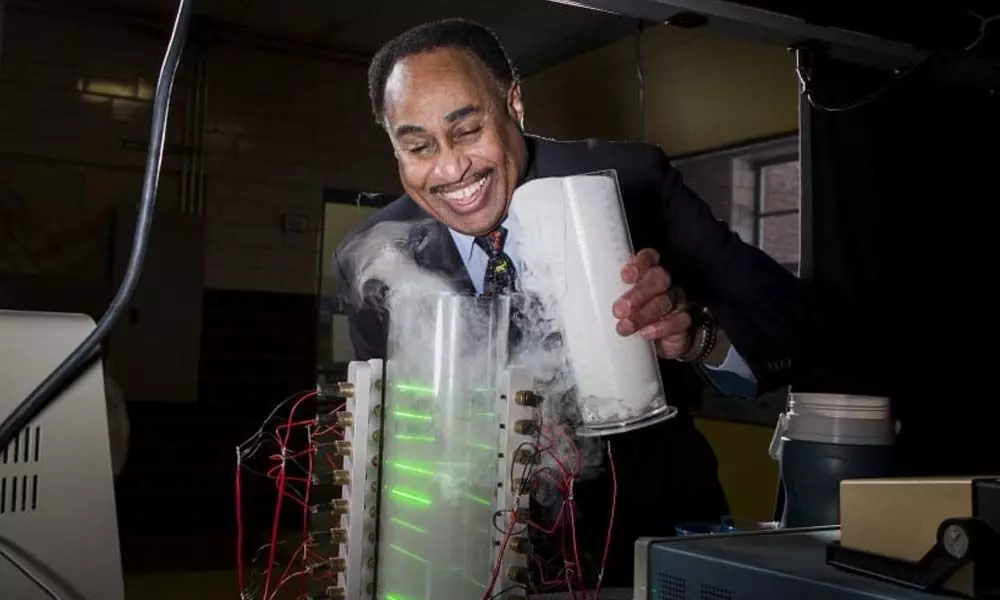Scientist Ron Mallett is Trying to Travel Back in Time

The book, “The Time Machine" changed my life, says Ron Mallett.
Ron Mallett was aged 10 when his father died suddenly, of a heart attack, an event that the scientist says changed the track of his life forever. "For me, the sun rose and set on him, he was just the centre of things," he tells CNN Travel. "Even today, after all of these years, there's still an unreality about it for me."
Mallett's father, a TV repairman, instilled in his son a love of reading and encouraged his budding passion for science. About a year after his father's death, a grieving Mallett stumbled across an illustrated version of the classic sci-fi novel "The Time Machine." "The book that changed my life," he says.
Thanks to the imagination of author H.G. Wells, suddenly Mallett felt his family tragedy presented not an end -- but a beginning.
Ron Mallett, an astrophysicist who has dedicated much of his adult life to the notion that time travel is possible. He's come up with the scientific equations and principles upon which he says a time machine could be created.
While acknowledging that his theories and designs are unlikely to allow time travel in his lifetime, for years he's been working in parallel to a respected academic career to fulfil his dream of venturing back in time to see his beloved father again.
Sixty years later, 74-year-old Mallett is a professor of physics at the University of Connecticut. He's spent his career investigating black holes and general relativity -- the theories of space, time and gravity famously explored by Albert Einstein.
He's still a long way from his destination -- some would argue he'll never get there -- but his voyage makes for a poignant story that dwells on the power of love, the potency of childhood dreams and the human desire to control destiny in an unknowable universe.
How to become a time traveller
Mallett first encountered the concept of time travel back in the 1950s.
"We hadn't even gone into space," he recalls. "And people weren't even sure if we could."
But when Mallett began speaking openly about his ideas, he found they struck a chord with many others, something he says shows the universality of the desire to revisit the past. We all have, he says, regrets, or past decisions we wonder about, or people we've lost who we long to see again.
"People started contacting me, literally from all over the world about the possibility of going back in time," he says.
The Science Behind it All
It all hinges, says Mallett, on Einstein's special theory of relativity and the general theory of relativity. To put it in a nutshell, Einstein said that time can be affected by speed."
Mallett gives the example of astronauts traversing space in a rocket that's travelling close to the speed of light. Time would pass differently on Earth than it would for the people in the rocket.
"They could actually come back finding out that they're only a few years older, but decades have passed here on Earth," he says.
Mallett points to the 1968 sci-fi classic movie "Planet of the Apes," at the end of which [spoiler alert] an astronaut realises that he hasn't travelled to a distant, ape-ruled planet, but merely returned to Earth in a post-apocalyptic future in which simians have subjugated humankind.
"That is an accurate representation of Einstein's special theory of relativity," says Mallet. "So the upshot is that, according to the special theory of relativity, if you're travelling fast enough, you respectively are travelling through time. And effectively, that would be a representation of time travel."
However, this is all about going forward not backward, so how would this help Mallett's quest to be reunited with his father?
Einstein's general theory of relativity is based on the concept of gravity -- and considers how time is affected by gravity.
"What Einstein meant by that is the stronger gravity is, the more time will slow down," says Mallett.
Einstein's general theory of relativity says that what we call the force of gravity isn't a force at all; it's actually the bending of space by a massive object.
"If you can bend space, there's a possibility of you twisting space. In Einstein's theory, what we call space also involves time -- that's why it's called space-time, whatever it is you do to space also happens to time."
Mallett posits that by twisting time into a loop, one could travel from the future back to the past -- and then back to the future. And this is the idea of a wormhole, a sort of tunnel with two openings. He suggests that light could also be used to affect time via something called a ring laser.
Mallett says, "It turned out my understanding about lasers eventually helped me in my breakthrough with understanding how I might be able to find a whole new way for the basis of a time machine. By studying the type of gravitational field that was produced by a ring laser, this could lead to a new way of looking at the possibility of a time machine based on a circulating beam of light."
Mallett's also got a theoretical equation that, he argues, proves this would work.
"Eventually a circulating beam of laser lights could act as a sort of a time machine and cause a twisting of time that would allow you to go back into the past. You can send information back, but you can only send it back to the point at which you turn the machine on," says Mallett.
Realities of Time Travel
Paul Sutter, an astrophysicist who hosts a podcast, says, "Time travel into the past is allowed, potentially, in our theory of general relativity, how we understand gravity, ask a Spaceman!"
"But every time we try to concoct a theoretical time travel device, some other bit of physics busts in and breaks up the party. He is aware of Mallett's work and thinks it's interesting, if not necessarily on track to deliver results. I don't think it's necessarily going to be fruitful, because I do think that there are deep flaws in his mathematics and his theory. So a practical device seems unattainable," says Sutter.
British science writer Brian Clegg says, "While not everyone agrees that his planned device would work, I think it's an interesting enough proposition to go for an experimental trial. If it did work, it should be stressed that it's not a practical time machine, it would simply produce a tiny but measurable effect, which would demonstrate the principle."
Mallett says, "It's not like the movies," says Mallett. "It's not going happen at the end of two hours, at the cost of whatever it is you pay for the movie ticket. It's going to cost."
Source: CNN Travel








